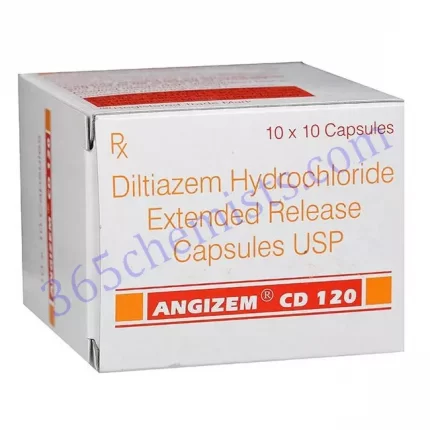Introduction
Nifedipine is the active ingredient in the pharmaceutical Depin Retard 20mg Tablet, which is used to treat a variety of cardiovascular conditions. Nifedipine is a member of the calcium channel blocker drug class, which increases blood flow by relaxing and widening blood vessels. Depin Retard 20mg Tablet is described in detail in this article, along with information on its composition, mode of action, recommended dosage, and any possible side effects.
Composition
Nifedipine, the active ingredient in Depin Retard 20mg Tablets, is present in 20 milligrammes of each tablet. The calcium channel blocker nifedipine selectively prevents calcium ions from entering blood vessel smooth muscle cells, causing the smooth muscle to relax and the blood vessels to enlarge. Along with these active ingredients, the tablet also includes lactose monohydrate, microcrystalline cellulose, and magnesium stearate.
Mechanism of Action
Nifedipine works by preventing calcium ions from entering blood vessel smooth muscle cells, which relaxes and dilates the arteries. As a result, blood pressure is lowered and peripheral vascular resistance is decreased. Nifedipine also directly affects cardiac muscle, lowering oxygen demand and myocardial contractility. Nifedipine is useful in the treatment of conditions like hypertension and angina because of its dual actions.
Therapeutic Uses
The primary indication for Depin Retard 20mg Tablet is the management of hypertension, also known as high blood pressure. Nifedipine lowers blood pressure and enhances blood flow by relaxing blood vessels. Additionally, it is employed in the treatment of angina, a condition marked by discomfort or pain in the chest brought on by a lack of blood flow to the heart muscle. By widening coronary arteries and increasing blood flow to the heart, nifedipine reduces angina symptoms. It is significant to remember that Depin Retard 20mg Tablet should only be consumed under a doctor’s supervision.
Related Product
Depin 5mg Capsule
Depin 10 mg Capsule
Depin Retard 20mg Tablet
Dosage Guidelines
Depending on the patient and their unique medical condition, the Depin Retard 20mg Tablet (Nifedipine) dosage may change. It’s crucial to adhere to the directions given by the medical professional who prescribed the medication. Typically, one tablet (20 mg) taken orally once per day is the recommended starting dose for treating hypertension. The tablet should not be chewed or crushed; it should be swallowed whole. Depending on how the patient reacts to treatment, the dosage may need to be changed. The dosage may change for the treatment of angina, so it’s crucial to speak with a medical expert for the right dosing instructions.
Side Effects
Depin Retard 20mg Tablet generally has a good tolerance, but some people may experience some side effects. Headache, lightheadedness, flushing, and peripheral edoema are typical side effects. Usually minor and brief, these side effects disappear as the body gets used to the medication. It is crucial to speak with a medical expert if these side effects persist or start to bother you. Rarely, more severe adverse effects like hypotension (low blood pressure), palpitations, or allergic reactions may be brought on by nifedipine. It is important to seek immediate medical attention if any of these serious side effects manifest.
Conclusion
Calcium channel blocker medication Depin Retard 20mg Tablet (Nifedipine) is used to treat angina and hypertension. Nifedipine efficiently lowers blood pressure and alleviates angina symptoms by relaxing blood vessels and enhancing blood flow. However, it’s crucial to use this medication under a doctor’s supervision and to be aware of any possible side effects. Patients can make educated decisions about their cardiovascular health by understanding its composition, mechanism of action, therapeutic uses, dosage recommendations, and potential adverse reactions. Keep in mind that this information is being provided as an overview and shouldn’t be used in place of seeking professional medical advice. Always seek the advice of a medical professional for personalised advice and treatment alternatives catered to your particular needs.
It’s important to be aware of a few warnings and contraindications when thinking about using Depin Retard 20mg Tablet (Nifedipine). People with a known hypersensitivity to nifedipine or any of the inactive ingredients in the tablet shouldn’t take this medication. Any pre-existing medical conditions, such as liver or kidney disease, heart failure, or a history of low blood pressure, must also be disclosed to the prescribing healthcare professional. They will weigh the risks and benefits and modify the dosage as necessary.
Furthermore, it’s crucial to follow the recommended dosage schedule and not go over it. An abrupt rise in blood pressure or a worsening of cardiovascular conditions can occur when taking a medication. Unless it is close to the time for the next scheduled dose, the missed dose should be taken as soon as it is remembered. In these situations, skipping the missed dose in favour of sticking to the regular dosing schedule is advised.
In conclusion, Depin Retard 20mg Tablet (Nifedipine) is a drug that is very important in the treatment of angina and hypertension. Nifedipine efficiently lowers blood pressure and alleviates angina symptoms by relaxing blood vessels and enhancing blood flow. However, it’s crucial to use this medication under a doctor’s supervision and to be aware of any possible side effects. Patients can make educated decisions about their cardiovascular health by understanding its composition, mechanism of action, therapeutic uses, dosage recommendations, and potential adverse reactions. Keep in mind that this information is being provided as an overview and shouldn’t be used in place of seeking professional medical advice. Always seek the advice of a medical professional for personalised advice and treatment alternatives catered to your particular needs.











